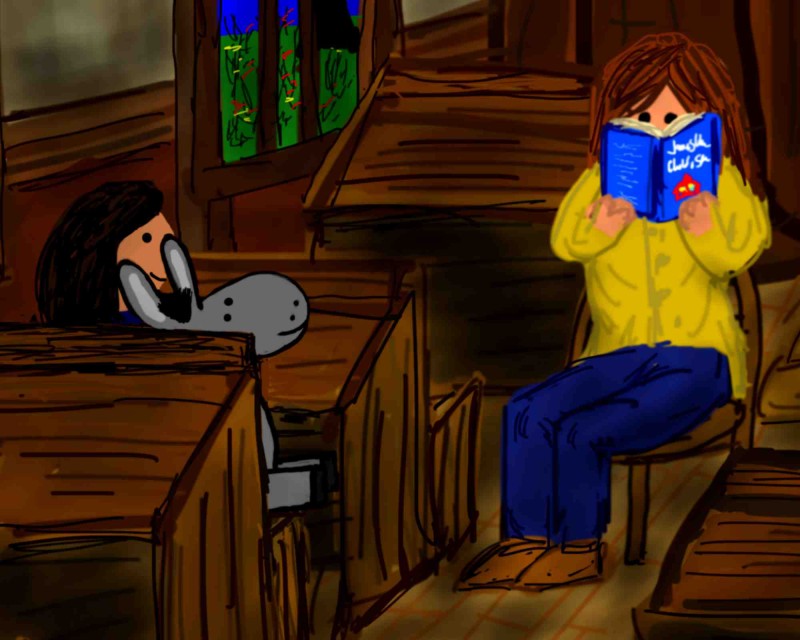Shall we read page three of The Children’s Story? said Ms. Johnson. Oh yes, said Virginia, I want to know why the teacher and children are afraid. Very well, said Ms. Johnson, page three says:
The children rustled, watching the teacher, wondering what possessed her… Johnny looked away from the door and watched with the other children. He did not understand anything except that the teacher was afraid, and because she was afraid she was making them all worse and he wanted to shout that there was no need to fear. “Just because they’ve conquered us there’s no need for panic-fear,” Dad had said. “Don’t be afraid, Johnny. If you fear too much, you’ll be dead even though you’re alive.”
We still don’t know why they’re afraid, said Virginia. No, we don’t, said Ms. Johnson. I don’t like to be afraid, said Virginia. Neither do I, said Ditto. Maybe that’s why Johnny has so much hate, said Virginia. Why? said Ms. Johnson. Because he doesn’t like to be afraid, and he’s angry at the person who’s making him afraid. Are we sure it’s a person? said Ms. Johnson. It says “they” conquered, said Virginia.
Who are they? said Ms. Johnson. I don’t know, said Virginia, but they must be bad if they conquered. Is conquering bad? said Ms. Johnson. That depends if you’re a conquer or a conquered, said Virginia. A “conqueror,” said Ms. Johnson. “They” could be another kind of animal, said Ditto. Like what? said Ms. Johnson. Any kind of animal that’s different from them, said Ditto, like a herd of rhinoceri. “Rhinoceroses,” said Ms. Johnson. Or a swarm of bees, said Ditto, or a school of piranhas. What’s a piranha? said Virginia. A piranha, said Ms. Johnson, is a freshwater fish with an insatiable appetite for meat. Insatiable? said Virginia. Impossible to satisfy, said Ms. Johnson. Oh, said Virginia.
Why don’t you like to be afraid? said Ms. Johnson. Because, said Virginia, I don’t know what’s going to happen. But something good might happen, said Ms. Johnson. But it might not, said Virginia. We fear the unknown, said Ditto, like Hamlet. Hamlet? said Ms. Johnson. Yes, said Ditto, my parents and their friend Blurtso staged a play called “Hamlet” last year. What does Hamlet say? said Ms. Johnson. He says, said Ditto, that he would rather stay with something familiar that doesn’t make him happy than take his chances with something unfamiliar. Something unfamiliar? said Ms. Johnson. Yes, said Ditto. Like what? said Ms. Johnson. Like death, said Ditto. Are you afraid of death? said Ms. Johnson. Yes, said Ditto. And you, Virginia? Yes, said Virginia.
Do you think Johnny is afraid of death in the story? said Ms. Johnson. Yes, said Ditto, or something worse. What’s worse than death? said Ms. Johnson. No one can say, said Ditto, until they know what death is. So it might not be bad? said Ms. Johnson. It might not, said Ditto, but we don’t know, so we create nightmares to fill the unknown. Is that what Johnny’s dad is telling us, said Ms. Johnson, when he says, “If you fear too much, you’ll be dead even though you’re alive”? Yes, said Ditto.
Have you ever heard of Franklin Delano Roosevelt? said Ms. Johnson. No, said Ditto. He was a president of the United States who said, “We have nothing to fear but fear itself.” What does that mean? said Virginia. It means, said Ditto, that the worst thing to do is be afraid. Why? said Virginia. Because when you’re afraid, said Ditto, you’ll do anything to stop being afraid. Do you think it’s easy, said Ms. Johnson, to frighten people into doing what you want them to do? Yes, said Ditto, all you have to do is convince them something unknown will happen if they don’t.
